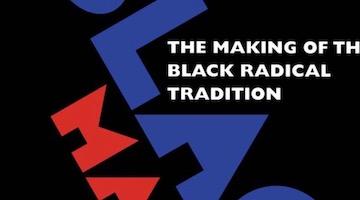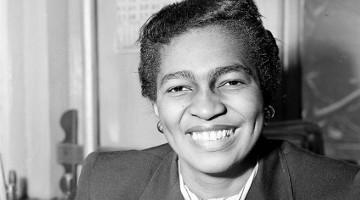In this series, we ask acclaimed authors to answer five questions about their book. This week’s featured author is Carole Boyce Davies. Davies is the Frank H.T. Rhodes Professor of Humane Letters at Cornell University. Her edited book is Claudia Jones: Beyond Containment.
Roberto Sirvent: How can your book help BAR readers understand the current political and social climate?
Carole Boyce Davies: Claudia Jones: Beyond Containment (Ayebia, 2011) is an edited collection of this writer/activist’s autobiographical reflections, essays, poems deliberately brought together so those interested in her work can find them all in one place. Claudia Jones also has an extensive number of journalistic essays which deserve their own collection. For the scholar-activist though, Beyond Containment is a substantial introduction to this iconic figure of black left feminism, Marxism, and Caribbean radical-intellectual activism. Audiences used to having only male representation in this area as in Hubert Harrison, C.L.R. James, George Padmore, Eric Williams, Frantz Fanon, Aime Cesaire, now have one of the foremost black women thinkers from the Black world to add to their pool of knowledge. And there are others who we must continue to add. We are in a time period again when socialism is held up as the category of rejection in the American narrative while simultaneously American youth see socialism as a necessity and leftist governments return in Latin America. Generally, in the United States, anyone asking for social justice is identified as a communist and it is the term used negatively to position any figure deemed to be oppositional or transformational. This ongoing redbaiting has the effect of further eliminating actual left figures who were/are socialist, avoiding their contributions to knowledge advancement while simultaneously making socialism always something evil and undesired, and entrenching the American narrative as a conservative, racial capitalist one.
What do you hope activists and community organizers will take away from reading your book?
Activists and community organizers should take away the nature of organizing across class, race and gender lines. Claudia Jones provides that example as she never sacrificed one of these positionalities and orthodoxies for the other in the face of race-only or gender-only or class-only formations. Additionally, the understanding of the international nature of Black struggle is identified here as against all odds. Claudia Jones lived an international experience, precipitated by migration first as a child to the United States as part of the first major wave of Caribbean migration where she experienced Jim Crow racism. Then her deportation to the United Kingdom allowed her the space to embrace the world stage with the organizing preparation already acquired through her US activism. This put her in place to advance developing Afro-Caribbean and Black communities in England. Indeed the definition of “Black” in Britain which for a long time included African-descended and Asian people can be traced directly back to the naming extension of the West Indian Gazette and Afro-Asian Caribbean News and her founding of CAACO – The Committee of Afro-Asian Caribbean Organizations in 1961. Her travels to China, Russia, Japan during her last years, including an audience with Chairman Mao and an interview with Mme Soong Ching Ling, wife of Sun Yat-Sin, place her ideologically as one with growing consciousness of the role of China as a counter-ideological force with which we still grapple. Finally, her use of journalism for activism and as a professional location is also significant following in the pathways of precursors like Ida B. Wells and Charlotta Bass.
We know readers will learn a lot from your book, but what do you hope readers will un-learn? In other words, is there a particular ideology you’re hoping to dismantle?
The tendency of activists to give their lives completely to struggle, leading often to lack of self-care is one that she like many of her generation of activists also presented. Stories about Claudia describe her as never stopping to rest despite hospitalization for ill-health, back to work soon thereafter. On more than one occasion Claudia Jones was hospitalized for health related care: In 1953, after her trial she suffered heart failure and was hospitalized for 21 days and diagnosed with hypertensive heart disease; after being incarcerated at Alderson and before travelling to the UK, she was hospitalized at Mt Sinai Hospital in 1955 following a heart attack; upon arriving in London she was hospitalized for 3 months in 1956; In 1962, while in the Soviet Union she writes from hospital, surrounding her ongoing heart disease issues offering social analyses and doing distant work (before internet communications) on behalf of the West Indian Gazette and Afro-Asian Caribbean News.
The role of the US state in creating or exacerbating existing health conditions with which human subjects are plagued is relevant as well. One has to unlearn a certain tendency to “blind objectivity” in dealings with the states’ institutions. Often there is a tendency to live and let live which can create blind spots or the legendary “fairness” as a principle. The ill treatment during incarceration and excessive stress are factors which clearly led to the demise of this group of activists, most of them dying in and around1964, seems to create a pattern which points directly to the state and its agencies. However, personal persistence marks activists consistently in that generation who, within the context of state repression, advanced progressive positions in spite of it all. Assassinations happened in various ways besides the obvious taking down of people like Malcolm X and Martin Luther King Jr., via gun violence. But, one can also study the health care patterns of activists for the intersection of state willful destruction along with the absence of personal self care for a few others including Stokely Carmichael (Kwame Ture) who often pressed forward without stopping or too late to take care of looming health concerns. The current generation of activists have built self-care into their activism and while this may seem selfish, to some, it is actually “radical self-care,” in the Audre Lorde definition, not “self-indulgence,” and therefore a direct means of achieving continuance.
In terms of ideology, the persistence in struggle within an organizational framework if it provides the ideological apparata for analysis remained consistent for Claudia Jones while she worked in the US and as a member of a cadre of Black creatively political left activists. Many rapidly exit from organizations or movements they are at odds with or participate in the now popular naming of “cancel culture” in the current time frame. But Claudia demonstrates how to challenge organizations in spite of these limitations around race and gender as she did then with the of CPUSA, which she framed as “neglect” in her classic and most cited essay, “An End to the Neglect of the Problems of Negro Women” (1949). Above all, she was determined to effect change within the organizational bureaucratic structure. The tendency in Marxism to work through a narrow view of the work-labor nexus has been one of the primary avenues of critique which positions Marxism at its limits in terms of what it is able to do. In my reading, Claudia Jones re-opens Marxism-Leninism with an intent to move the analyses to a different place of action. This is perhaps an exercise in “unlearning” rapid abandonment of political positions [people who say for example, “I am no longer a Marxist” and then peddle or act out conservative policies or those who claim the position and act the opposite]. The Sylvia Wynter response that Marx got it only partially right, i.e. that it is not just labor that was being reproduced but the entire definition of the human is perhaps an advance on this limitation which has plagued scholars analyzing what to do about how racism which still infects white workers and as such blocks them and us from building powerful analyses for social change. From W.E.B. DuBois’s Black Reconstruction in America (1935) to Cedric Robinson’s Black Marxism: The Making of the Black Radical Tradition (1983) one witnesses the attempts to grapple with this race/class nexus, often to the exclusion of gender. This was the intent of Left of Karl Marx. The Political Life of Black Communist Claudia Jones (2008), the text which brought Jones and the contradictions in communism with which she struggled, challenged and reconfigured to a more user-friendly version and thereby to more directed recognition by an ever-growing pool of readers.
Who are the intellectual heroes that inspire your work?
My intellectual heroes are definitely Claudia Jones for her amazing contributions to challenging the narrow Black (North) Atlantic formation by her presence, activism and ideas. I learn more about her each time I engage her work, life and meaning. I am also inspired by Ida B. Wells who did all of that anti-lynching research, study and analysis and managed a family relationship simultaneously and challenged white suffragists who thought she could not do both and rejected marginalization in that movement as well; and Angela Y. Davis who in our own contemporary existence actually paid the price of activism in the US including incarceration and attempts by the Governor of California to strip her of her professional affiliation and livelihood while continuing to live the life of the scholar-activist through various generations and into senior status often denied young activists. From the Caribbean, the student-activism of Stokely Carmichael during his Howard University years was an amazing model for Caribbean students like me in providing a way of entering and engaging the US African American struggles for dignity, equality and transcendence but also linking these with world struggles for the same. Stokely’s commitment to an African diaspora citizenship and also his willingness to go to the root of a problem and try to solve it was always an amazing rhetorical strategy to witness in real time. Cumulatively, they provide examples of various ways of doing intellectual work and activism in different modes that some of us only approximate. I also like Sylvia Wynter’s trajectory as a theoretician and scholar who began her life’s creative journey as a dancer, actor and novelist and now is finally recognized as one of the leading cultural theorists by a new generation of scholars. I also like how James Baldwin’s mind worked through a problem, engaging those entrenched racialized positions unflinchingly, with a certain clarity in the public arena before the current social media and TV-experts and political analysts in ascendence.
In what way does your book help us imagine new worlds?
This work allows us to use the past examples of struggle to advance beyond narrow nationalisms. There is a tendency to often work with the immediate, the local and not see how that particular experience is connected to world revolution and black freedom struggles in global contexts. This work lets us see how activists like Claudia Jones saw the possibilities of a more equitable and just world. The nation-state as we have received it is no longer viable. The purported models of democracy as advanced by the US are seen around the world as a “failed experiment” so clarified in the last presidency and continuing loopholes that are pretty fascistic. A governor in the state of Florida presents an act to ban critical race theory, an intellectual study, which if this happened elsewhere would be a US media frenzy and political machinery cause for sanctions. This is an identical stance to a governor during the Civil Rights period standing in the doorway of a school to symbolically block the entry of Black children to a place of knowledge. In this case knowledge is being blocked to all children and adults. Indeed, the model we operate under is still in bell hooks terms “white supremacist capitalist heteropatriarchy,” a construct which leaves out a range of people who have to argue themselves into acceptance and recognition at every level. Additionally, we operate from a context in which those with privilege are able to operate and extend their levels of wealth, Amazon-Bezos style, without any boundaries. This applies to not just wealthy Europeans but Africans and African-Americans who are able to get access. Some of the wealthiest people in the world are continental Africans like billionaire Aliko Dangote. If we think of creating better worlds, then some structure of a more equitable means of access has to be imagined. This is what Claudia Jones works towards, in her actualizing of Marx’s statement that “The philosophers have only interpreted the world, in various ways. The point, however, is to change it.”
Roberto Sirvent is editor of the Black Agenda Report Book Forum.














